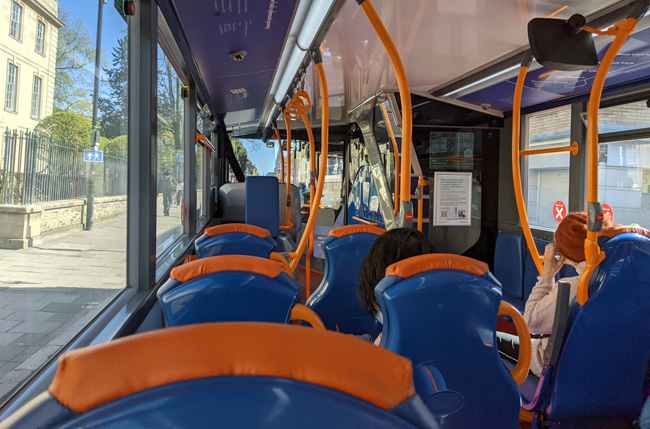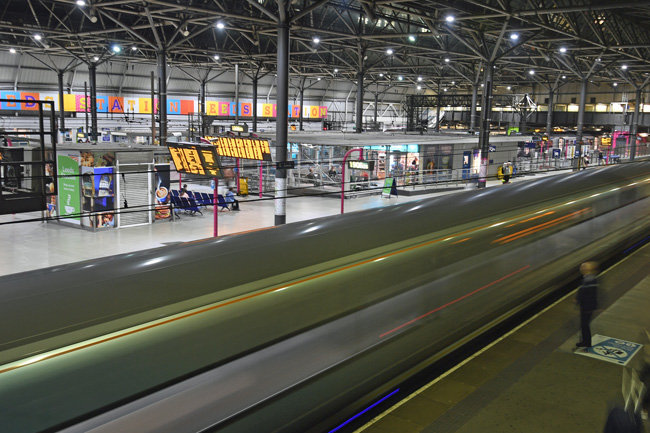Capacity on public transport has been increased and social distancing relaxed from Monday to coincide with the easing of COVID-19 prevention measures in England.
Transport for London (TfL) said it was already running a ‘full’ network of around 8,000 buses every day. After consultation with the Department for Transport (DfT) and in line with bus services across the country, most seats on buses can be used, although rear-facing seats in bays will be blocked off.
TfL said the capacity of double-decker buses will increase to around 60. It added that the introduction of new rail timetables will see some minor changes to train times on TfL Rail, London Overground and Bakerloo line services.
TfL Transport Commissioner Andy Byford said: ‘We are looking forward to welcoming customers back to our network, and are operating near-normal levels of service to support social distancing.’
However, TfL said that ‘as more people return to the network there will be occasions when social distancing will not be possible and advised users of frequent Tube, bus and rail services to consider waiting for the next service if necessary’.

A bus with mainly forward-facing seats, Cambridge, April 2021
In a statement, the Confederation for Passenger Transport said: ‘As restrictions ease and more people begin to move around places public transport will be busier than we have seen during the pandemic. On busy routes at busy times this means it may not always be possible to socially distance and some passengers may need to sit next to each other. Where possible we are encouraging passengers to plan their journey in advance and travel off peak if they can.’
Rail firms also added 2,500 daily services at the weekend coinciding with one of the twice yearly timetable changes. Most of these trains were already listed on passenger information and ticket purchase sites such as the National Rail website.
The Rail Delivery Group said the increase would bring the total number of daily weekday services to over 20,500 but also acknowledged that as passenger numbers increase social distancing may not be possible on all journeys, ‘so rail companies are providing better information to help people avoid busier trains’.

Leeds Railway Station
Restrictions on travel have severely impacted the finances of TfL, as well as bus and rail operators more widely, requiring billions of pounds in subsidy and cuts to services, including the ongoing suspension of London’s Night Tube.
The aviation industry has been badly hit by restrictions on international travel. On Monday Ryanair reported a loss of €815m for the financial year ending 31 March, which it described as the most challenging in its 35-year history
Also, on Monday a new traffic light system came into operation with a limited ‘Green List’ of countries but travel largely discouraged.
The Campaign for Better Transport said it was pleased that the Government had listened to ‘some’ of the concerns held by an ‘unprecedented coalition’ it had co-ordinated about social distancing and its impact on public transport, set out in a letter to the prime minister.
Chief executive Paul Tuohy said: ‘We welcome the fact that these concerns are being addressed in relation to buses. But trains and trams are also critical to getting people back into city centres.
‘Without more being done we risk slowing down the high street recovery as many people will simply stay away, or worse seeing towns and cities that are more reliant on public transport being left behind while car-heavy areas experience increased pollution and congestion.’
He added: ‘We hope that the Government continues to send a loud and clear message that travelling by public transport is both safe and desirable.’
Anthony Smith, chief executive of independent watchdog Transport Focus, said: ‘Passengers have told us they want more space on board so they will welcome the increase in services.
‘The next few weeks will be crucial in helping to rebuild passenger confidence step by step.’
The DfT has issued new COVID-19 guidance ‘to help transport organisations in England understand how to provide safer workplaces and services for themselves, their workers and passengers’.
The guidance states that ‘transport operators, as employers, must carry out a risk assessment’ and also stresses that operators must ‘consider accessibility at every stage of the passenger journey’.
Separate guidance applies to the devolved nations.
Register now for full access
Register just once to get unrestricted, real-time coverage of the issues and challenges facing UK transport and highways engineers.
Full website content includes the latest news, exclusive commentary from leading industry figures and detailed topical analysis of the highways, transportation, environment and place-shaping sectors.
Use the link below to register your details for full, free access.
Already a registered? Login